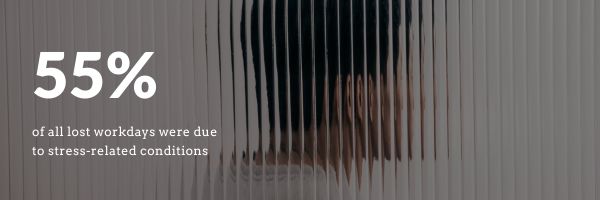Stress leave from work is one of the fastest-growing reasons for employee absence in Europe. In 2024, official reports show that millions of workdays were lost because of stress, anxiety, and depression. These issues are often tied directly to the workplace.
In the UK, the Health and Safety Executive (HSE) reported a total of 16.4 million workdays lost between 2023 and 2024. This was due to work-related stress, depression, or anxiety. In France, similar concerns are growing: nearly one in four sick leaves among workers under 30 were due to mental health issues in 2024.
Stress is not only a health problem. It’s also a productivity issue and a safety risk.
Let's look at some data:

📌 In both countries, stress leave from work is increasing year over year– particularly among younger employees. The trend reflects not just personal strain but deeper systemic issues at work.
Stress-related absence leads to more days lost per employee than most physical illnesses. Common flu might take someone out for a few days. Stress or bunrout can lead to weeks or even months off.
In both the UK and France:
More importantly, stress increases human error. Rushing, fatigue, and frustration all affect focus and reaction time and this raises the risk of accidents. That’s why tools like YOUFactors, which help reduce mental slips and attention loss, are increasingly used in safety programmes.
The biggest contributor to sick leave from work due to stress is the workplace itself. The key reasons are:
In a recent survey by a French health insurance (2), 66% of young workers said their mental health issues were caused by work pressure and poor work-life balance. In the UK, HSE reports(1) show similar causes, especially in public service and healthcare roles.
Stress leave from work affects some industries far more than others. Workload, public-facing roles, and high responsibility jobs contribute to uneven rates of absence. Data from the HSE (7) shows that health, education, and public service sectors carry the highest burden of lost workdays due to stress.

Human health and social work, public administration, and education together account for nearly 7.5 million lost days – showing that frontline and service-heavy roles are at the greatest risk of stress-related absence.
Stress doesn't just come from work tasks. It also stems from:
In a recent UK survey by Ciphr (6), 50% of women cited feeling tired or lack of sleep as their biggest stress trigger – compared to only 31% of men.
Remote work can also play a part. While it offers flexibility, it can blur the line between work and home. This can lead to overworking or feeling isolated. Both can cause more mental strain.
Beyond the workplace, external pressures also play a role in stress-related absences. Economic uncertainty, job insecurity, and the ongoing mental toll of the pandemic remain major triggers.
An emerging factor is climate change burnout. Studies show that nearly 45% of young people(4) say climate concerns negatively affect their daily lives and work. Eco-anxiety – feelings of fear, helplessness, or guilt over the environment – can lead to burnout. Rising global temperatures also threaten future working hours through increased heat stress, especially in physical or outdoor roles (5).
While climate anxiety may not be the primary cause of stress leave from work, it adds to the growing mental load employees face today.
The effects of stress leave ripple across the business:
A single stress-related absence often lasts three weeks or more. If it becomes a recurring issue, it puts long-term strain onother people and budgets.
For the person affected, stress leave is rarely just “a few days off”. It’s usually the result of months of internal strain, and often leads to:
In the Malakoff Study (2), it is revealed that 64% of employees returning from long-term leave said they found it hard to resume work smoothly.
The best way to reduce stress leave is to prevent it building up in the first place.
Companies can take steps to prevent stress. They can:
Catching stress early can prevent burnout. A few approaches are:
The sooner support starts, the fewer workdays will be lost to stress.
A healthy work culture reduces the need for stress leave. It should include:
To recap:
YOUFactors helps teams build better habits, reduce mental errors, and stay alert. Less stress. Fewer mistakes. Safer outcomes.
Sources
Learn, practice, and build safer habits in minutes with YOUFactors.
 See How it Works ▶️
See How it Works ▶️.avif)